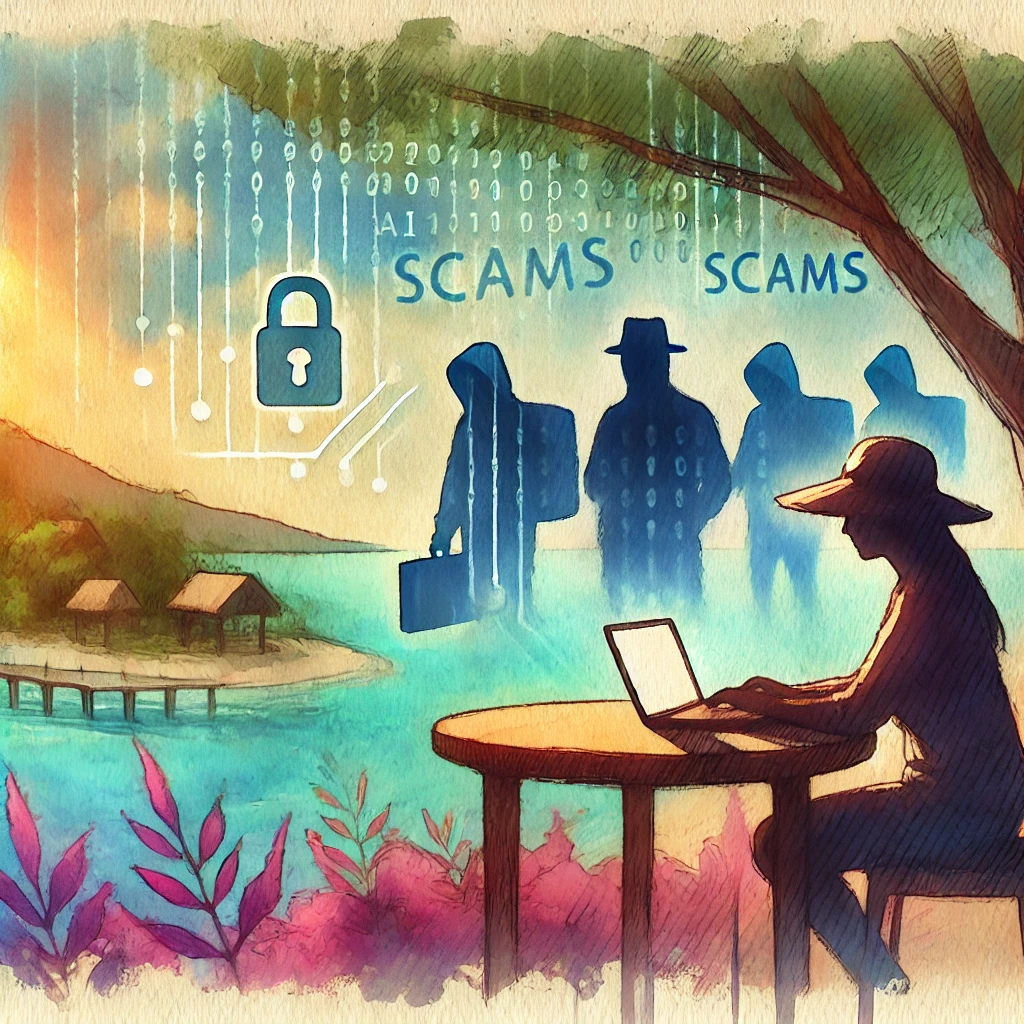Booking.com says travel scams are getting worse because of new technology called artificial intelligence (AI). Marnie Wilking, who works on internet safety at Booking.com, says there are more phishing attacks now. Scammers use AI to make fake emails and booking links that look real. She tells hotels and travelers to use two-factor authentication and be careful when clicking on links.
AI makes it harder to spot scams, but Booking.com also uses AI to find and remove fake hotels from its website. They use AI to block or take down fake listings before anyone books them. Experts want travel companies to do more to tell people about these scams and how to stay safe. They suggest doing good research, checking contact details, booking package holidays, and using credit cards for extra safety.
In short, AI is making travel scams more common and harder to detect. Booking.com asks everyone to be careful and use extra security steps like two-factor authentication. They also use AI to fight back by removing fake listings. Experts say more awareness and advice are needed to help people avoid these scams.
Original news source: Booking.com warns of up to 900% increase in travel scams (BBC)
🎧 Listen:
Slow
Normal
Fast
📖 Vocabulary:
| 1 | artificial | Made by humans, not natural |
| 2 | phishing | Tricking people to get their personal information |
| 3 | authentication | Proving something is real or true |
| 4 | scammers | People who trick others to steal money or information |
| 5 | detect | To find or notice something |
| 6 | block | To stop something from happening |
| 7 | listings | Items or properties available for sale or rent |
| 8 | research | Looking for information about something |
| 9 | package | A group of things put together |
| 10 | awareness | Knowing about something |
| 11 | security | Keeping something safe |
| 12 | avoid | To stay away from something |
Group or Classroom Activities
Warm-up Activities:
– News Summary
Instructions: In pairs, students will read the article and then summarize the main points in their own words. They can take turns sharing their summaries with the class.
– Opinion Poll
Instructions: Divide the class into small groups. Each group will come up with three questions related to travel scams and AI. They will then take turns asking the questions to the other groups and recording their responses. Afterward, each group will share the results with the class.
– Vocabulary Pictionary
Instructions: Write down key vocabulary words from the article on separate pieces of paper. Divide the class into teams. One student from each team will take turns choosing a word and then drawing it on the board without using any letters or numbers. The team members will try to guess the word. The team with the most correct guesses wins.
– Keyword Taboo
Instructions: Write down key vocabulary words from the article on separate pieces of paper. Divide the class into two teams. One student from each team will take turns drawing a word and describing it to their team without using the keyword or any derivative of it. The team members will try to guess the word. The team with the most correct guesses wins.
– Think-Pair-Share
Instructions: Have the students think about the following question: “How can travelers protect themselves from travel scams?” Then, have them pair up with a partner and discuss their ideas. Afterward, each pair will share their ideas with the class.
🤔 Comprehension Questions:
1. Why are travel scams getting worse?
2. How do scammers use AI to trick people?
3. What does Booking.com do to fight against fake hotels?
4. What are some ways that travel companies can help people stay safe from scams?
5. Why is AI making it harder to spot scams?
6. What is two-factor authentication and why is it important?
7. What are some extra security steps that people can take to protect themselves?
Go to answers ⇩
🎧✍️ Listen and Fill in the Gaps:
Booking.com says (1)______ scams are getting worse because of new (2)______ called artificial intelligence (AI). Marnie Wilking, who works on (3)______ safety at Booking.com, says there are more phishing attacks now. Scammers use AI to make fake emails and booking links that look real. She tells hotels and travelers to use two-factor authentication and be careful when clicking on (4)______.
AI makes it harder to spot scams, but (5)______ also (6)______ AI to find and remove fake hotels from its website. They use AI to block or take down fake listings before anyone books them. Experts (7)______ travel companies to do more to tell (8)______ about these scams and how to stay safe. They suggest doing good research, checking contact details, booking package holidays, and using credit cards for extra (9)______.
In short, AI is making travel scams more common and harder to detect. Booking.com asks everyone to be careful and use (10)______ security steps like two-factor authentication. They also use AI to fight back by removing (11)______ listings. Experts say more awareness and advice are needed to (12)______ people avoid these scams.
Go to answers ⇩
💬 Discussion Questions:
Students can ask a partner these questions, or discuss them as a group.
1. What is artificial intelligence (AI) and how does it relate to travel scams?
2. How would you feel if you received a fake email or booking link while planning a trip?
3. Do you like the idea of using two-factor authentication for extra security? Why or why not?
4. What do you think are some ways to spot and avoid travel scams?
5. Why do you think scammers use AI to create fake emails and booking links?
6. How do you feel about travel companies using AI to remove fake listings from their websites?
7. Do you think travel companies should do more to inform people about travel scams? Why or why not?
8. What steps do you usually take to stay safe when booking travel accommodations?
9. How would you feel if you found out that you had booked a fake hotel?
10. Do you think it’s important to do research and check contact details before booking a trip? Why or why not?
11. Why do you think using credit cards can provide extra safety when booking travel?
12. What do you think can be done to raise awareness and provide more advice about travel scams?
Individual Activities
📖💭 Vocabulary Meanings:
Match each word to its meaning.
Words:
1. artificial
2. phishing
3. authentication
4. scammers
5. detect
6. block
7. listings
8. research
9. package
10. awareness
11. security
12. avoid
Meanings:
(A) Made by humans, not natural
(B) Tricking people to get their personal information
(C) To stay away from something
(D) Looking for information about something
(E) Items or properties available for sale or rent
(F) To stop something from happening
(G) Proving something is real or true
(H) Keeping something safe
(I) People who trick others to steal money or information
(J) A group of things put together
(K) To find or notice something
(L) Knowing about something
Go to answers ⇩
🔡 Multiple Choice Questions:
1. Why are travel scams getting worse, according to Booking.com?
(a) Because people are not careful enough
(b) Because hotels are not doing enough to protect their guests
(c) Because credit cards are not safe to use while traveling
(d) Because of new technology called artificial intelligence (AI)
2. How do scammers use AI to trick people?
(a) By creating fake emails and booking links that look real
(b) By hacking into hotel websites
(c) By stealing credit card information
(d) By sending spam messages to travelers
3. What does Booking.com do to fight against travel scams?
(a) They warn hotels and travelers about potential scams
(b) They offer insurance against scam-related losses
(c) They use AI to remove fake hotels from their website
(d) They block all bookings made with credit cards
4. What advice do experts give to people to stay safe from travel scams?
(a) Avoid using credit cards while traveling
(b) Only book hotels that have been verified by the government
(c) Do good research, check contact details, book package holidays, and use credit cards for extra safety
(d) Share personal information with hotel staff to confirm the booking
5. How does AI make it harder to spot scams?
(a) AI can hack into hotel websites and steal personal information
(b) AI can create very convincing fake emails and booking links
(c) AI can block all communication from scammers
(d) AI can detect scams and alert the user immediately
6. What is two-factor authentication?
(a) A security measure that requires two different methods to verify a user’s identity
(b) A type of scam that targets travelers
(c) A way to book hotels without using a credit card
(d) A technology that removes fake listings from travel websites
7. What does Booking.com ask everyone to do to stay safe?
(a) Share personal information with hotel staff
(b) Avoid using credit cards while traveling
(c) Only book hotels that have been verified by the government
(d) Be careful and use extra security steps like two-factor authentication
8. What do experts say is needed to help people avoid travel scams?
(a) More travel insurance options
(b) More awareness and advice
(c) More government regulations on travel companies
(d) More advanced AI technology
Go to answers ⇩
🕵️ True or False Questions:
1. Scammers are not using AI to generate fake emails and booking links that appear authentic.
2. Booking.com claims that travel scams are improving because of a new technology known as artificial intelligence (AI).
3. Marnie Wilking, who works on internet safety at Booking.com, dissuades hotels and travelers to avoid using two-factor authentication and be careless when clicking on links.
4. AI is making travel scams more common and harder to detect.
5. Experts want travel companies to do more to educate people about these scams and how to stay safe.
6. Booking.com encourages no one to be cautious and avoid using extra security measures like two-factor authentication, while also avoiding AI to eliminate fake listings.
7. Booking.com also uses AI to find and remove fake hotels from its website.
8. Good research, checking contact details, booking package holidays, and using credit cards can help protect against scams.
Go to answers ⇩
📝 Write a Summary:
Write a summary of this news article in two sentences.
Check your writing now with the best free AI for English writing!
Writing Questions:
Answer the following questions. Write as much as you can for each answer.
Check your answers with our free English writing assistant!
1. Why are travel scams getting worse?
2. How do scammers use AI to trick people?
3. What does Booking.com do to fight against fake hotels?
4. What are some ways people can protect themselves from travel scams?
5. What do experts say needs to be done to help people avoid scams?
✅ Answers
🤔✅ Comprehension Question Answers:
1. Why are travel scams getting worse?
Travel scams are getting worse because scammers are using new technology called artificial intelligence (AI) to make fake emails and booking links that look real.
2. How do scammers use AI to trick people?
Scammers use AI to create fake emails and booking links that look real. They use this technology to make their scams harder to spot.
3. What does Booking.com do to fight against fake hotels?
Booking.com uses AI to find and remove fake hotels from its website. They use this technology to block or take down fake listings before anyone books them.
4. What are some ways that travel companies can help people stay safe from scams?
Travel companies can help people stay safe from scams by providing more awareness and advice about these scams. They can also encourage people to do good research, check contact details, book package holidays, and use credit cards for extra safety.
5. Why is AI making it harder to spot scams?
AI is making it harder to spot scams because scammers are using this technology to create fake emails and booking links that look very real. It’s becoming more difficult to tell the difference between a scam and a real booking.
6. What is two-factor authentication and why is it important?
Two-factor authentication is an extra security step that requires you to provide two pieces of information to prove your identity. It’s important because it makes it harder for scammers to access your personal information or accounts.
7. What are some extra security steps that people can take to protect themselves?
Some extra security steps that people can take to protect themselves include using two-factor authentication, being careful when clicking on links, doing good research before booking, checking contact details, booking package holidays, and using credit cards for extra safety.
Go back to questions ⇧
🎧✍️✅ Listen and Fill in the Gaps Answers:
(1) travel
(2) technology
(3) internet
(4) links
(5) Booking.com
(6) uses
(7) want
(8) people
(9) safety
(10) extra
(11) fake
(12) help
Go back to questions ⇧
📖💭✅ Vocabulary Meanings Answers:
1. artificial
Answer: (A) Made by humans, not natural
2. phishing
Answer: (B) Tricking people to get their personal information
3. authentication
Answer: (G) Proving something is real or true
4. scammers
Answer: (I) People who trick others to steal money or information
5. detect
Answer: (K) To find or notice something
6. block
Answer: (F) To stop something from happening
7. listings
Answer: (E) Items or properties available for sale or rent
8. research
Answer: (D) Looking for information about something
9. package
Answer: (J) A group of things put together
10. awareness
Answer: (L) Knowing about something
11. security
Answer: (H) Keeping something safe
12. avoid
Answer: (C) To stay away from something
Go back to questions ⇧
🔡✅ Multiple Choice Answers:
1. Why are travel scams getting worse, according to Booking.com?
Answer: (d) Because of new technology called artificial intelligence (AI)
2. How do scammers use AI to trick people?
Answer: (a) By creating fake emails and booking links that look real
3. What does Booking.com do to fight against travel scams?
Answer: (c) They use AI to remove fake hotels from their website
4. What advice do experts give to people to stay safe from travel scams?
Answer: (c) Do good research, check contact details, book package holidays, and use credit cards for extra safety
5. How does AI make it harder to spot scams?
Answer: (b) AI can create very convincing fake emails and booking links
6. What is two-factor authentication?
Answer: (a) A security measure that requires two different methods to verify a user’s identity
7. What does Booking.com ask everyone to do to stay safe?
Answer: (d) Be careful and use extra security steps like two-factor authentication
8. What do experts say is needed to help people avoid travel scams?
Answer: (b) More awareness and advice
Go back to questions ⇧
🕵️✅ True or False Answers:
1. Scammers are not using AI to generate fake emails and booking links that appear authentic. (Answer: False)
2. Booking.com claims that travel scams are improving because of a new technology known as artificial intelligence (AI). (Answer: False)
3. Marnie Wilking, who works on internet safety at Booking.com, dissuades hotels and travelers to avoid using two-factor authentication and be careless when clicking on links. (Answer: False)
4. AI is making travel scams more common and harder to detect. (Answer: True)
5. Experts want travel companies to do more to educate people about these scams and how to stay safe. (Answer: True)
6. Booking.com encourages no one to be cautious and avoid using extra security measures like two-factor authentication, while also avoiding AI to eliminate fake listings. (Answer: False)
7. Booking.com also uses AI to find and remove fake hotels from its website. (Answer: True)
8. Good research, checking contact details, booking package holidays, and using credit cards can help protect against scams. (Answer: True)
Go back to questions ⇧













